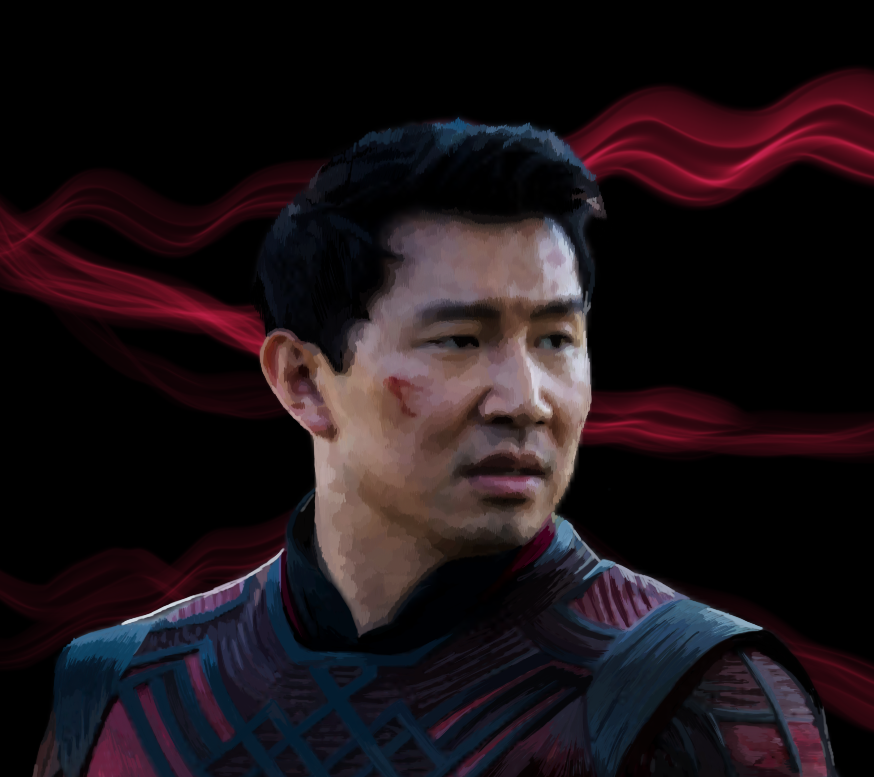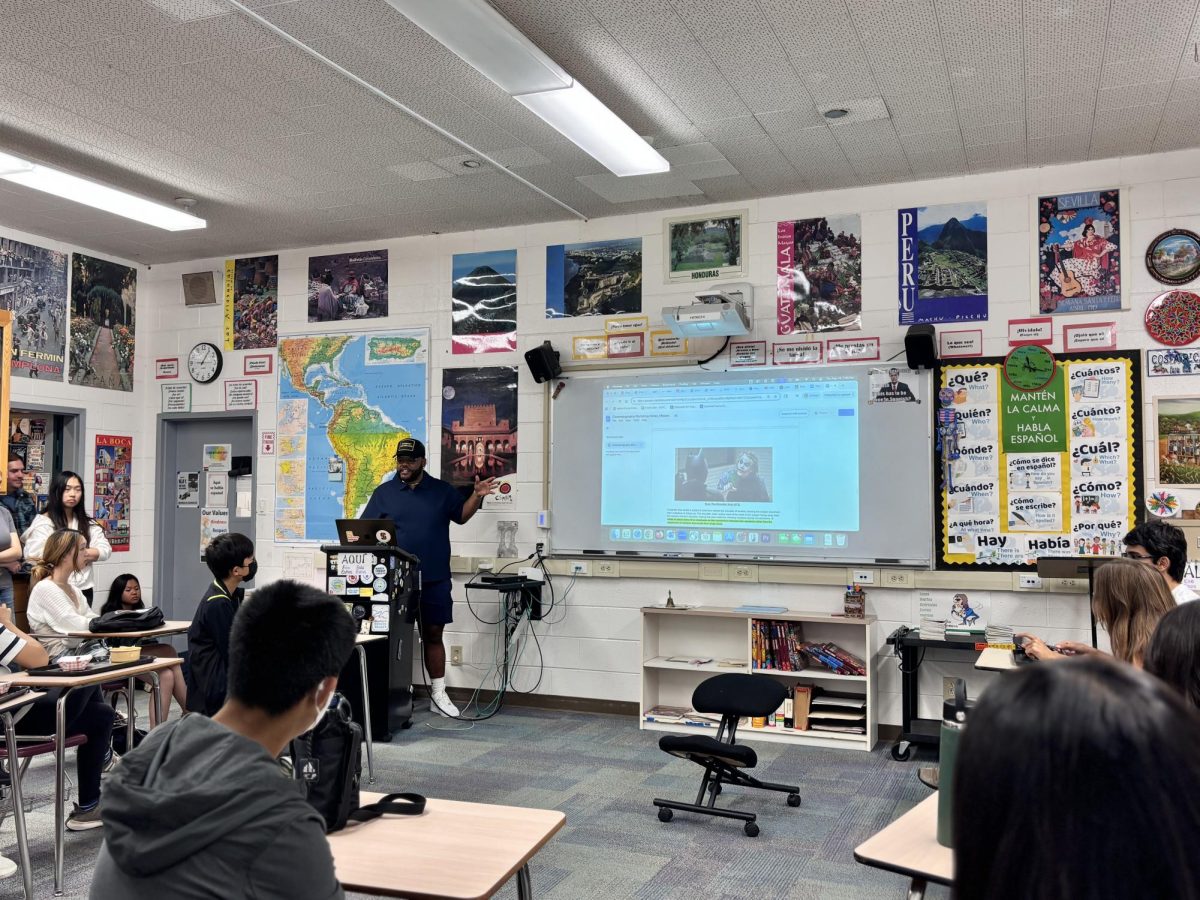Movie review: “Shang-Chi” makes waves as first Asian Marvel superhero movie
“Shang-Chi and the Legend of the Ten Rings” opened in theaters on Sept. 3 and instantly began to break records: first Marvel movie released exclusively in theaters since 2019, highest Labor Day box office opening, first Marvel movie to feature an Asian lead hero. It received 92% on Rotten Tomatoes, bringing it to fifth place out of all 25 Marvel movies according to the Tomatometer, tied with “Spider-Man: Homecoming” and “Guardians of the Galaxy.”
September 30, 2021
As a Chinese American accustomed to seeing Asian faces excluded from blockbuster movies, I never thought I would see the quintessential Marvel theme song fade into a shot full of Chinese characters; I never thought I would see an American superhero sit with his friend’s family eating congee or partake in tomb-sweeping at the Qingming Festival, but it’s finally happened.
“Shang-Chi and the Legend of the Ten Rings” opened in theaters on Sept. 3 and instantly began to break records: first Marvel movie released exclusively in theaters since 2019, highest Labor Day box office opening, first Marvel movie to feature an Asian lead hero. It received 92% on Rotten Tomatoes, bringing it to fifth place out of all 25 Marvel movies according to the Tomatometer, tied with “Spider-Man: Homecoming” and “Guardians of the Galaxy.” Fans took to social media to praise the movie, deeming it the best solo Marvel movie yet.
Just watched Shang Chi
Best MCU origins movie. Amazing visuals and fighting choreography
Easy 9/10 at least pic.twitter.com/QryOEB2Ijh
— Tensai Danho (@0Danho) September 23, 2021
And I wholeheartedly agree with all the accolades given to the movie. It beautifully traces the titular character’s (played by Simu Liu) reconciliation with his past as a trained assassin working for his father Wenwu’s (played by Tony Leung Chiu-wai) criminal organization as well as the family’s shared grief over Shang-Chi’s mother Ying Li’s (played by Fala Chen) untimely death.
In contrast to the 2020 live action rendition of “Mulan,” which Disney touted as a celebration of Chinese culture but ultimately fell short with historical inaccuracies and westernization, “Shang-Chi” accurately depicts multiple facets of Chinese culture from mythological creatures (including dragons, hunduns and nine-tailed foxes) to different traditional martial arts styles. Not to mention, about half of the film’s dialogue was spoken in Mandarin, and the repeat-worthy soundtrack featured Asian and Pacific Islander artists.
Nonetheless, I particularly loved the stunning martial arts fight scenes: the elegant, romantic kung fu “tango” between Wenwu and his wife-to-be Ying Li in a bamboo forest; Shang-Chi’s expertly maneuvered kicks on a moving bus; the fast-paced conflict between Shang-Chi and Ten Rings soldiers on scaffolding above the bright lights of Macau. Fight choreographers excellently established clean pacing and rhythm, and the creative camerawork, which involved the camera following the characters and shaking upon the impact of a blow, really added tension and dynamic motion. I loved the contrast between Chinese-boxing-inspired and Tai-chi-based fight styles to differentiate separate groups.
While the film was laden with CGI during the scenes in the mythical village of Ta Lo, especially during the final battle featuring Chinese mythological creatures, these effects did not distract me because of their magical execution. In comparison to other fairytale-esque Marvel movies such as “Thor: The Dark World” (deemed the worst one out of the bunch by Rotten Tomatoes), “Shang-Chi” incorporates elements of fantasy effortlessly into the fictional universe, making the cinematic experience absolutely sublime.
As much as I loved the plot and visuals, I still had some reservations. I did notice that the movie focused more on Shang-Chi’s Chinese identity rather than his experience as an Asian American. I wish he struggled more with feeling out of place in China, something many Asian Americans including myself grapple with when visiting one’s motherland. The movie could have explored the complexity of being a “perpetual outsider” in both the US and China instead of having Shang-Chi be unrealistically welcomed as a fully Chinese person by his mother’s very traditionally Chinese family even after many years of living in America.
For the cast, renowned Hong Kong movie star Tony Leung carried out most of the emotional scenes. An actor best known for his ability to convey subtle nuances in a character, Leung brings humanity to cold-blooded killer Wenwu, communicating his grief for his wife and love for his children despite his power and deplorable actions. I (and others) consider him the best and possibly the most complex Marvel villain to date. I somewhat enjoyed the sprinkling of humor throughout the movie by Awkwafina (Katy Chen, Shang-Chi’s friend) and Ben Kingsley (Trevor Slattery, pseudo villain from “Iron Man 2” who makes a cameo), which felt far less artificial than the out-of-place jokes in “Avengers: Endgame” and “Black Widow”—seriously, I love Yelena Belova, but is it realistic to be spewing snark when your life’s on the line?
At the same time, unfortunately, Leung’s caliber eclipses the acting of other cast members, even overshadowing the titular protagonist. Liu incontestably is an excellent martial artist, but his limited range of facial expressions in comparison to Leung’s throughout the film paint Shang-Chi as flat. The writing and placement of their jokes still felt formulaic in Marvel blockbuster fashion.
But of course, these are all minor nitpicky gripes I have with “Shang-Chi”—it stands as a wonderful celebration of Chinese culture as well as an excellently executed superhero action film, and I would absolutely call it the best Marvel origin movie.


















![“[Building nerf blasters] became this outlet of creativity for me that hasn't been matched by anything else. The process [of] making a build complete to your desire is such a painstakingly difficult process, but I've had to learn from [the skills needed from] soldering to proper painting. There's so many different options for everything, if you think about it, it exists. The best part is [that] if it doesn't exist, you can build it yourself," Ishaan Parate said.](https://harkeraquila.com/wp-content/uploads/2022/08/DSC_8149-900x604.jpg)




![“When I came into high school, I was ready to be a follower. But DECA was a game changer for me. It helped me overcome my fear of public speaking, and it's played such a major role in who I've become today. To be able to successfully lead a chapter of 150 students, an officer team and be one of the upperclassmen I once really admired is something I'm [really] proud of,” Anvitha Tummala ('21) said.](https://harkeraquila.com/wp-content/uploads/2021/07/Screen-Shot-2021-07-25-at-9.50.05-AM-900x594.png)







![“I think getting up in the morning and having a sense of purpose [is exciting]. I think without a certain amount of drive, life is kind of obsolete and mundane, and I think having that every single day is what makes each day unique and kind of makes life exciting,” Neymika Jain (12) said.](https://harkeraquila.com/wp-content/uploads/2017/06/Screen-Shot-2017-06-03-at-4.54.16-PM.png)








![“My slogan is ‘slow feet, don’t eat, and I’m hungry.’ You need to run fast to get where you are–you aren't going to get those championships if you aren't fast,” Angel Cervantes (12) said. “I want to do well in school on my tests and in track and win championships for my team. I live by that, [and] I can do that anywhere: in the classroom or on the field.”](https://harkeraquila.com/wp-content/uploads/2018/06/DSC5146-900x601.jpg)
![“[Volleyball has] taught me how to fall correctly, and another thing it taught is that you don’t have to be the best at something to be good at it. If you just hit the ball in a smart way, then it still scores points and you’re good at it. You could be a background player and still make a much bigger impact on the team than you would think,” Anya Gert (’20) said.](https://harkeraquila.com/wp-content/uploads/2020/06/AnnaGert_JinTuan_HoHPhotoEdited-600x900.jpeg)

![“I'm not nearly there yet, but [my confidence has] definitely been getting better since I was pretty shy and timid coming into Harker my freshman year. I know that there's a lot of people that are really confident in what they do, and I really admire them. Everyone's so driven and that has really pushed me to kind of try to find my own place in high school and be more confident,” Alyssa Huang (’20) said.](https://harkeraquila.com/wp-content/uploads/2020/06/AlyssaHuang_EmilyChen_HoHPhoto-900x749.jpeg)











